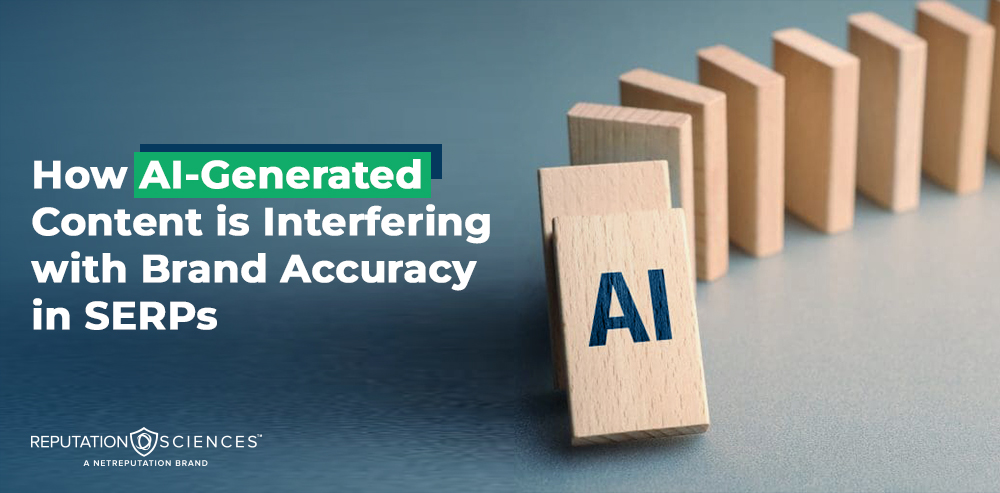How AI-Generated Content is Interfering with Brand Accuracy in SERPs

AI-generated content has become a staple in digital marketing. From blog posts and email subject lines to ad copy and product descriptions, AI tools can produce content at lightning speed. However, that convenience comes with a price: maintaining brand accuracy in search engine results is becoming increasingly complex.
While artificial intelligence has revolutionized the content creation process, it’s also introducing background noise that search engines and users must now filter through. As businesses scale their content strategy with generative AI, they’re often creating more content, but not always more value.
Why AI-Generated Content Is Everywhere
Generative AI enables faster and more cost-efficient content creation. Large language models, such as ChatGPT or Jasper, can generate blog posts, video scripts, social media posts, and even entire websites with minimal human input. Add AI-generated images or video, and you’ve got a complete content marketing suite in minutes.
These tools help brands:
- Save time on manual tasks
- Automate content generation for scale
- Produce high-quality results at a lower cost
- Streamline keyword research and topic ideation
The use of AI-generated content has expanded rapidly, as it enables marketers to keep pace with the relentless demand for fresh, relevant content across multiple channels. From social media posts to email campaigns, AI content tools can automatically apply relevant keywords and optimize content for search engine results, helping brands maintain visibility in crowded digital spaces.
However, as AI-generated content floods the internet, issues surrounding quality control, brand alignment, and misinformation are beginning to emerge in search engine results pages (SERPs).
How AI-Generated Content Affects Search Engine Accuracy
Search engines like Google are designed to deliver reliable, helpful content to users. But when AI-generated content isn’t properly labeled, edited, or monitored, it can:
- Duplicate existing content across multiple sites, leading to diluted SEO value
- Introduce incorrect information without proper fact-checking
- Bury human-generated content that reflects a real person, brand voice, or expert insight
The result? Brands lose control over how they appear in search engine results. A blog post created to showcase thought leadership might be outranked by AI-generated text repurposed across a dozen websites with higher domain authority.
Google Search’s algorithms prioritize high-quality content created with expertise, experience, authoritativeness, and trustworthiness (E-E-A-T). When AI-generated content lacks human oversight or fails to provide new ideas and additional information, it risks being deprioritized or flagged as unhelpful. This makes it critical for brands to ensure their AI-generated content meets these standards.
When AI Becomes a Liability
Even with the best intentions, brands using AI content generators risk compromising their credibility. Here’s how:
- Misleading Information: Without human oversight, AI-generated text can misstate facts, leading to brands appearing unreliable.
- Lack of Human Touch: AI-generated content work lacks nuance, emotional intelligence, and cultural awareness—all essential for connecting with audiences.
- Search Engine Confusion: AI generation at scale overwhelms search engine algorithms, pushing high-quality content further down the page.
- Ethical Concerns: Failing to label content as AI-generated or disclose content creation methods can damage trust.
Moreover, synthetic media, such as AI-generated images or videos, when not adequately disclosed, can mislead audiences and harm a brand’s reputation. Platforms like Vimeo and others now require creators to label content containing AI-generated elements to maintain transparency.
What Brands Should Do Instead
Brands can still leverage AI tools without compromising accuracy or trust. Here’s how to strike the right balance:
- Always Disclose AI-Generated Content
- Apply the “AI-generated” label clearly, as recommended by platforms and search engines.
- Let users know which parts were created by a real person versus those created by artificial intelligence.
- Use AI as a Starting Point, Not the Final Draft
- AI content is a draft—human writing is what brings real value.
- Edit for tone, clarity, and factual accuracy using reliable editing tools.
- Require Human Oversight
- Assign real people to review, verify, and optimize content before it is published.
- Focus on helping users, not just ranking for relevant keywords.
- Diversify Your Content Strategy
- Mix AI-generated content with human stories, video, opinion pieces, and thought leadership.
- Prioritize originality over volume to maintain brand authenticity.
- Use AI to Enhance Creative Work, Not Replace It
- Automate time-consuming tasks like formatting, metadata, or topic clustering.
- Let creators spend more time on storytelling and strategic planning.
Balancing Efficiency with Brand Accuracy in SERPs
The key to maintaining brand accuracy in search engine results pages (SERPs) lies in balancing the speed and scale AI offers with the quality and authenticity only humans can provide. Brands that rely solely on AI-generated content risk flooding the web with generic, repetitive, or inaccurate material that can confuse search engines and alienate users.
In contrast, brands that integrate AI-generated content with careful human editing and strategic oversight can produce new content that is both efficient and aligned with brand values. This approach helps maintain a strong, trustworthy presence in search results.
Conclusion: AI Should Support, Not Sabotage, Your Brand
AI-generated content is here to stay, but it’s up to brands to use it responsibly. If not, the very tools designed to help you create more content can start damaging your brand’s accuracy, trust, and visibility.
To stay competitive, brands must evolve their content creation process. This means blending AI speed with human creativity, maintaining high editorial standards, and continually optimizing content for both search engines and users.
